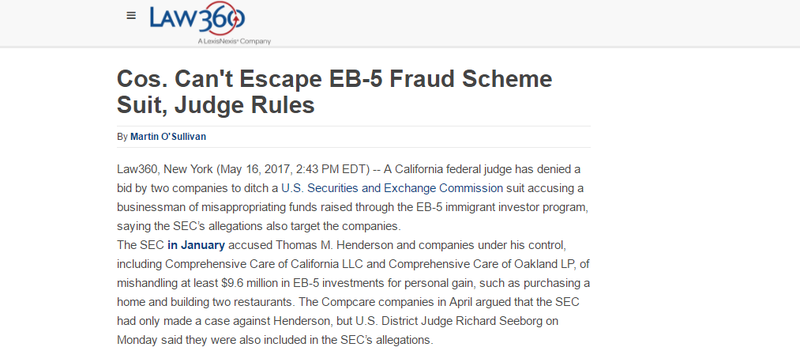Cos. Can't Escape EB-5 Fraud Scheme Suit, Judge Rules
A California federal judge has denied a bid by two companies to ditch a U.S. Securities and Exchange Commission suit accusing a businessman of misappropriating funds raised through the EB-5 immigrant investor program, saying the SEC’s allegations also target the companies.
The SEC in January accused Thomas M. Henderson and companies under his control, including Comprehensive Care of California LLC and Comprehensive Care of Oakland LP, of mishandling at least $9.6 million in EB-5 investments for personal gain, such as purchasing a home and building two restaurants. The Compcare companies in April argued that the SEC had only made a case against Henderson, but U.S. District Judge Richard Seeborg on Monday said they were also included in the SEC’s allegations.
“Compcare’s argument … is premised on disregarding the extensive allegations of conduct undertaken by defendant Thomas Henderson in connection with, and as a manager of, Compcare,” Judge Seeborg said.
The suit alleges Henderson, 68, used Compcare and other companies under his control to commingle funds from the EB-5 projects to "mask" the true sources of the funds, according to the SEC.
From September 2010 through at least October 2016, Henderson sought investments for seven EB-5 projects — a skilled nursing facility, three call centers, a warehousing business, a retail grocery and restaurant business and a dairy processing business — according to the suit.
Henderson raised at least $115 million from about 215 investors, mostly Chinese nationals who contributed $500,000 each to fund one of the seven projects, according to the SEC.
The investors believed they were participating in the EB-5 program, which provides a means for foreign nationals to qualify for permanent residency in the U.S., if they make a qualified investment of $500,000 or more in a project that creates or preserves 10 or more jobs for U.S. workers.
But rather than using these investor contributions for the projects, Henderson commingled the investments with revenue from his company accounts for personal gain, according to the SEC. For example, the businessman used $346,000 of investor funds to purchase a $1.4 million home in Oakland, used $3.8 million of the funds to build and operate two restaurants in Oakland and used $5.1 million from commingled funds for other unrelated business ventures, the SEC said.
Yosef Peretz, an attorney representing the Compcare companies, told Law360 on Tuesday that he was "disappointed that Judge Seeborg denied the motion but ... very confident that once the evidence will come to light, CCOO will be removed from the case."
The SEC did not respond to a request for comment on Tuesday afternoon.
The SEC is represented by Andrew J. Hefty, Susan F. LaMarca and Thomas J. Eme.
Compcare is represented by Sumy Kim and Yosef Peretz of Peretz & Associates.
Henderson is represented by Gilbert R. Serota of Arnold & Porter Kaye Scholer LLP.
The case is Securities and Exchange Commission v. San Francisco Regional Center LLC et al., case number 3:17-cv-00223, in the U.S. District Court for the Northern District of California.
https://www.law360.com/articles/924346/cos-can-t-escape-eb-5-fraud-scheme-suit-judge-rules
Mentions
Litigation Cases
States
- New York
Videos





Subscribe for News
Site Digest
Join Professionals on EB5Projects.com →
Securities Disclaimer
This website is for informational purposes only and does not constitute an offer or solicitation to sell shares or securities. Any such offer or solicitation will be made only by means of an investment's confidential Offering Memorandum and in accordance with the terms of all applicable securities and other laws. This website does not constitute or form part of, and should not be construed as, any offer for sale or subscription of, or any invitation to offer to buy or subscribe for, any securities, nor should it or any part of it form the basis of, or be relied on in any connection with, any contract or commitment whatsoever. EB5Projects.com LLC and its affiliates expressly disclaim any and all responsibility for any direct or consequential loss or damage of any kind whatsoever arising directly or indirectly from: (i) reliance on any information contained in the website, (ii) any error, omission or inaccuracy in any such information or (iii) any action resulting therefrom.



